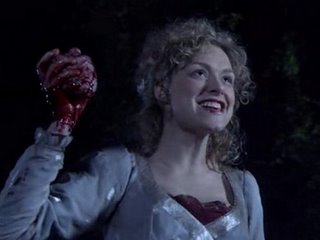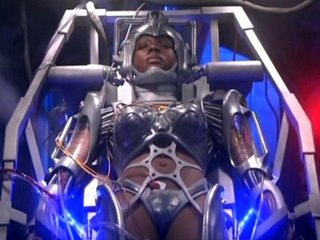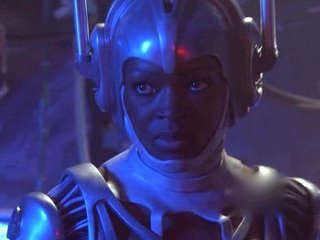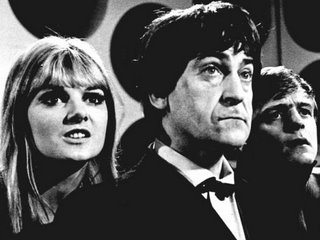skip to main |
skip to sidebar

 “Torchwood” seems to be attracting interesting guest stars. Last week, in Chris Chibnall’s well-titled “Countrycide”, Owen Teale popped up towards the end of the episode as the leader of a group of Brecon Beacon villagers intent on cannibalism once every decade, almost as though he’d stayed on at the end of “Vengeance on Varos” ready to appear in “The Two Doctors”! And this week, starring throughout Toby Whithouse’s “Greeks Bearing Gifts”, Daniela Denby-Ashe, best known for long running sitcom “My Family”, played exiled and abandoned alien “Mary” who worms her way into Toshiko’s affections, with the present of a pendant that enables the wearer to read the innermost thoughts of others, in order to eventually invite herself into the Hub of Torchwood itself to retrieve her ship. Said thoughts made for a depressing indictment of the human race.The balance between the personal relationships of the heroes and the science fiction strands of the story worked better in “Greeks Bearing Gifts” than it has previously, in both “Torchwood” and new “Doctor Who”, maybe because the alien artefact was a direct link between the two elements, making it an excellent plot device. Toby’s script benefited from his earlier experience writing “Doctor Who” episode “School Reunion” where the balance wasn’t as well executed. Daniela sustained a convincing performance throughout, possibly not an easy thing to do when alternating between tearing out the hearts of her victims down through time with present-day lesbian liaisons in Cardiff cafés! She played it as a femme fatale, which worked well enough, eventually brought to book by Captain Jack resetting her transport home to burn her up in the heart of the Sun. Hot stuff!!
“Torchwood” seems to be attracting interesting guest stars. Last week, in Chris Chibnall’s well-titled “Countrycide”, Owen Teale popped up towards the end of the episode as the leader of a group of Brecon Beacon villagers intent on cannibalism once every decade, almost as though he’d stayed on at the end of “Vengeance on Varos” ready to appear in “The Two Doctors”! And this week, starring throughout Toby Whithouse’s “Greeks Bearing Gifts”, Daniela Denby-Ashe, best known for long running sitcom “My Family”, played exiled and abandoned alien “Mary” who worms her way into Toshiko’s affections, with the present of a pendant that enables the wearer to read the innermost thoughts of others, in order to eventually invite herself into the Hub of Torchwood itself to retrieve her ship. Said thoughts made for a depressing indictment of the human race.The balance between the personal relationships of the heroes and the science fiction strands of the story worked better in “Greeks Bearing Gifts” than it has previously, in both “Torchwood” and new “Doctor Who”, maybe because the alien artefact was a direct link between the two elements, making it an excellent plot device. Toby’s script benefited from his earlier experience writing “Doctor Who” episode “School Reunion” where the balance wasn’t as well executed. Daniela sustained a convincing performance throughout, possibly not an easy thing to do when alternating between tearing out the hearts of her victims down through time with present-day lesbian liaisons in Cardiff cafés! She played it as a femme fatale, which worked well enough, eventually brought to book by Captain Jack resetting her transport home to burn her up in the heart of the Sun. Hot stuff!!
 So, “Doctor Who” has reached its 43rd birthday. What condition it’s in depends on your point of view. For years, long-term fans hoped for its return, me included, and now it’s up-and-running some of us feel it would have been better left alone. I still don’t feel as though the programme, as I think of it, is actually back. It’s “Doctor Who”, Jim, but not as we know it! Anniversaries should be a time of celebration but not necessarily if the recipient is terminally ill. “Doctor Who” has rarely been more popular than it is now, maybe because it’s an altogether different beast from the show that ran between 1963 and 1989, in that it’s supposedly much slicker in its present state, or maybe because the marketing machine that persistently tells us it’s brilliant is simply better oiled than previously, even than what now seems like the halcyon days of John Nathan-Turner back in the Eighties.Russell T Davies has produced nothing that remotely touches the quality of “The Caves of Androzani” or “Revelation of the Daleks” despite hiring the same director to work on Tennant’s opening year, presumably hoping that some of Graeme Harper’s magic would rub off on the new format. Even when RTD has got close, the executive producer seems intent on throwing a spanner in the works. In “The Empty Child”, for example, in an otherwise inventive two-part story, the only thing this supposedly creative production team could come up with, when Nancy blackmails the homeowner, was a homosexual extramarital affair with the butcher. Does Russell really think it’s hip to fill the minds of ten-year-old children with what boils down to indoctrination through crappy writing? Playing with fairies at the bottom of the garden, in amongst the prickly roses, is perhaps left better to shows that go out later, shows like “Torchwood”.I suppose it could be argued that “Caves” goes over the top with its violence or that “Revelation” was too explicit in Jobel’s intentions towards Peri. If that is the case, why don’t these stories leave a bad taste in the mouth like some of the scenes in new “Doctor Who”? It doesn’t surprise me that Michael Grade has given the new series the thumbs up. I am surprised that Colin Baker is a fan. There are four serials I would much rather watch from season twenty-two than anything that has been produced in the last couple of years. Maybe I see “Doctor Who” in 1985 through rose-red ruby-tinted spectacles because these were the first serials I had the opportunity to video. But despite retaining these recordings, I’ve still purchased “Revelation”, “Vengeance on Varos” and “The Two Doctors” on DVD! Now, what I want to know is when is “Attack of the Cybermen” going to complete this quartet?!!
So, “Doctor Who” has reached its 43rd birthday. What condition it’s in depends on your point of view. For years, long-term fans hoped for its return, me included, and now it’s up-and-running some of us feel it would have been better left alone. I still don’t feel as though the programme, as I think of it, is actually back. It’s “Doctor Who”, Jim, but not as we know it! Anniversaries should be a time of celebration but not necessarily if the recipient is terminally ill. “Doctor Who” has rarely been more popular than it is now, maybe because it’s an altogether different beast from the show that ran between 1963 and 1989, in that it’s supposedly much slicker in its present state, or maybe because the marketing machine that persistently tells us it’s brilliant is simply better oiled than previously, even than what now seems like the halcyon days of John Nathan-Turner back in the Eighties.Russell T Davies has produced nothing that remotely touches the quality of “The Caves of Androzani” or “Revelation of the Daleks” despite hiring the same director to work on Tennant’s opening year, presumably hoping that some of Graeme Harper’s magic would rub off on the new format. Even when RTD has got close, the executive producer seems intent on throwing a spanner in the works. In “The Empty Child”, for example, in an otherwise inventive two-part story, the only thing this supposedly creative production team could come up with, when Nancy blackmails the homeowner, was a homosexual extramarital affair with the butcher. Does Russell really think it’s hip to fill the minds of ten-year-old children with what boils down to indoctrination through crappy writing? Playing with fairies at the bottom of the garden, in amongst the prickly roses, is perhaps left better to shows that go out later, shows like “Torchwood”.I suppose it could be argued that “Caves” goes over the top with its violence or that “Revelation” was too explicit in Jobel’s intentions towards Peri. If that is the case, why don’t these stories leave a bad taste in the mouth like some of the scenes in new “Doctor Who”? It doesn’t surprise me that Michael Grade has given the new series the thumbs up. I am surprised that Colin Baker is a fan. There are four serials I would much rather watch from season twenty-two than anything that has been produced in the last couple of years. Maybe I see “Doctor Who” in 1985 through rose-red ruby-tinted spectacles because these were the first serials I had the opportunity to video. But despite retaining these recordings, I’ve still purchased “Revelation”, “Vengeance on Varos” and “The Two Doctors” on DVD! Now, what I want to know is when is “Attack of the Cybermen” going to complete this quartet?!!

 “Cyberwoman” was possibly the most satisfying of the first four episodes of “Torchwood”. I say possibly because there was nothing in it to match the two minutes screen time allotted John Normington in last week’s third episode, “Ghost Machine”. It wasn’t his dialogue, either, that captured the moment but the history of his character was all in John’s facial expressions. Gareth Thomas, too, made the most of his few scenes in the final twenty minutes of the same episode. His body language, especially the stooped gait, was spot on. This week’s fourth episode was similarly structured, in terms of the introduction of guest characters, in that we meet a Japanese Doctor early on, who has arrived to save the half-converted Cyberwoman’s soul, and a pizza delivery girl, who actually achieves, temporarily, what the Doctor couldn’t, towards the conclusion.“Cyberwoman” was a roller coaster of an episode only marred by the intrusion of attempted light relief. Gwen’s boyfriend phoning in order to get her to record “Wife Swap” was more of the same pop culture references that currently clog up new “Doctor Who”. Totally unnecessary; as was the need to engage the characters in yet more tedious tonsil tennis. I wonder if those scenes were written by the episode’s writer Chris Chibnall? James Strong’s direction lived up to the standard he set himself in “The Impossible Planet” except, here, he was allowed the luxury of more gore. The consequences of failed conversion were more explicitly explored in the demise of the two guest characters mentioned previously. What we really had in this episode was a reworking of Mary Shelley’s “Frankenstein”, with Ianto in the role of the obsessive Doctor character, of that novel, the Cyberwoman his creation, and the Japanese Doctor and pizza girl, not forgetting girlfriend Lisa, sacrifices to out-of-control science. “Doctor Who” has reworked “Frankenstein” before, of course, most obviously in “The Brain of Morbius” and therein lies the clue to the twist in this tale.Some loose ends weren’t readily tied up. “Cyberwoman” required a big leap of faith for the audience to easily accept that Ianto had never before aroused suspicions or that some other thing hadn’t drawn the Torchwood team’s attention to the possibility of something nasty in the basement. I’m pretty certain there isn’t an Ice Warrior in my loft though perhaps I better go and have another look! There is no way on Earth that Ianto should be allowed to stay on the team after this incident but “Torchwood” doesn’t seem bothered by any moral implications. In the first episode, “Everything Changes”, it was explained by Tosh that the body of a hospital porter, having been killed by a rogue Weevil, would be reported missing before being washed up on shore a few days later. I would like to have known how the bodies of the victims in “Cyberwoman” were to be disposed? You could hardly explain the Japanese Doctor’s Cyber eye away too easily or the pizza girl’s brain transplant! Surely she would be missed at work, at the very least. Unless they’re totally stupid, the takeaway services who supply Torchwood must already be becoming suspicious!Finally, I did enjoy the brief fight between Lisa the Cyberwoman and Myfanwy the Pterodactyl. It occurred to me that this was the dinosaur’s revenge for extinction in “Earthshock”, essentially at the hands of the Cybermen, and this provided the episode with an interesting cyclical aura; but maybe that’s just my fancy!
“Cyberwoman” was possibly the most satisfying of the first four episodes of “Torchwood”. I say possibly because there was nothing in it to match the two minutes screen time allotted John Normington in last week’s third episode, “Ghost Machine”. It wasn’t his dialogue, either, that captured the moment but the history of his character was all in John’s facial expressions. Gareth Thomas, too, made the most of his few scenes in the final twenty minutes of the same episode. His body language, especially the stooped gait, was spot on. This week’s fourth episode was similarly structured, in terms of the introduction of guest characters, in that we meet a Japanese Doctor early on, who has arrived to save the half-converted Cyberwoman’s soul, and a pizza delivery girl, who actually achieves, temporarily, what the Doctor couldn’t, towards the conclusion.“Cyberwoman” was a roller coaster of an episode only marred by the intrusion of attempted light relief. Gwen’s boyfriend phoning in order to get her to record “Wife Swap” was more of the same pop culture references that currently clog up new “Doctor Who”. Totally unnecessary; as was the need to engage the characters in yet more tedious tonsil tennis. I wonder if those scenes were written by the episode’s writer Chris Chibnall? James Strong’s direction lived up to the standard he set himself in “The Impossible Planet” except, here, he was allowed the luxury of more gore. The consequences of failed conversion were more explicitly explored in the demise of the two guest characters mentioned previously. What we really had in this episode was a reworking of Mary Shelley’s “Frankenstein”, with Ianto in the role of the obsessive Doctor character, of that novel, the Cyberwoman his creation, and the Japanese Doctor and pizza girl, not forgetting girlfriend Lisa, sacrifices to out-of-control science. “Doctor Who” has reworked “Frankenstein” before, of course, most obviously in “The Brain of Morbius” and therein lies the clue to the twist in this tale.Some loose ends weren’t readily tied up. “Cyberwoman” required a big leap of faith for the audience to easily accept that Ianto had never before aroused suspicions or that some other thing hadn’t drawn the Torchwood team’s attention to the possibility of something nasty in the basement. I’m pretty certain there isn’t an Ice Warrior in my loft though perhaps I better go and have another look! There is no way on Earth that Ianto should be allowed to stay on the team after this incident but “Torchwood” doesn’t seem bothered by any moral implications. In the first episode, “Everything Changes”, it was explained by Tosh that the body of a hospital porter, having been killed by a rogue Weevil, would be reported missing before being washed up on shore a few days later. I would like to have known how the bodies of the victims in “Cyberwoman” were to be disposed? You could hardly explain the Japanese Doctor’s Cyber eye away too easily or the pizza girl’s brain transplant! Surely she would be missed at work, at the very least. Unless they’re totally stupid, the takeaway services who supply Torchwood must already be becoming suspicious!Finally, I did enjoy the brief fight between Lisa the Cyberwoman and Myfanwy the Pterodactyl. It occurred to me that this was the dinosaur’s revenge for extinction in “Earthshock”, essentially at the hands of the Cybermen, and this provided the episode with an interesting cyclical aura; but maybe that’s just my fancy!
 Whilst many people in the UK celebrate the suppression of conspirator Guy Fawkes, in 1605, there is another anniversary I would like to acknowledge! Forty years ago to the day, BBC1 broadcast episode one of “The Power of the Daleks”, the first story to star Patrick Troughton in the title role of “Doctor Who”. Pat’s successful continuation of the part made famous by predecessor William Hartnell, “the original, you might say”, ensured the survival of this family-orientated science fiction drama series through successive generations. His contribution to the legend that is “Doctor Who” shouldn’t be underestimated simply because his era of the programme isn’t well-represented in the BBC archive. A great number of programmes replace one actor with another, in the same role, without explanation simply because, in story terms, it’s unexplainable! “Doctor Who” built this necessity into the ongoing narrative, turning something potentially disastrous for the show into something positive.Patrick also made the role his own. From being a grumpy old man, and I use the phrase with the greatest affection, used to dusting the TARDIS console with his handkerchief, the Doctor regenerated into an impish, recorder-playing, vagabond of the skies, whilst still retaining the respect of the programme’s many followers. Critics maintain that the Doctor you see first remains your favourite. My first was Bill but I’ve always found it hard to choose between him and Pat due to the fact that Pat’s middle season of three, season five, remains my favourite year of “Doctor Who”, and “Fury from the Deep”, from near the end of that season, my all-time favourite story. So many of my favourite “Doctor Who” stories emanate from the Patrick Troughton era. Another, “The Invasion”, raising the Cybermen out of the sewers to march against the backdrop of St Paul’s Cathedral, is out on DVD tomorrow.Troughton confronted the Cybermen no less than four times so that his era became synonymous with the period of “Doctor Who” when those monsters of logic were at their most powerful in capturing the nation’s imagination. Of the twenty-one stories he recorded for television, between 1966 and 1969, ten featured what are now regarded as the four most popular monsters of the Sixties. The second Doctor battled the Daleks twice, both in his first year, and other “classic” confrontations pitted him against “The Ice Warriors” and “The Abominable Snowmen”. His second meeting with the Cybermen, in the Tombs on Telos, presumed lost forever, was miraculously discovered and returned to the archive for the benefit of enthusiasts everywhere, whilst his second meeting with those furry Yeti, in the London Underground, in “The Web of Fear”, is much loved by most fans blessed with a reasonably good memory! The aforementioned final black and white encounter with the Cybermen, as well as the second Yeti story, were directed with elegant precision by Douglas Camfield. In a month which also sees the collected DVD release of recent material featuring the Cybermen, if you could only choose one or the other, Troughton’s eight-part “Invasion” or the four Tennant Cybermen episodes, which would you prefer?
Whilst many people in the UK celebrate the suppression of conspirator Guy Fawkes, in 1605, there is another anniversary I would like to acknowledge! Forty years ago to the day, BBC1 broadcast episode one of “The Power of the Daleks”, the first story to star Patrick Troughton in the title role of “Doctor Who”. Pat’s successful continuation of the part made famous by predecessor William Hartnell, “the original, you might say”, ensured the survival of this family-orientated science fiction drama series through successive generations. His contribution to the legend that is “Doctor Who” shouldn’t be underestimated simply because his era of the programme isn’t well-represented in the BBC archive. A great number of programmes replace one actor with another, in the same role, without explanation simply because, in story terms, it’s unexplainable! “Doctor Who” built this necessity into the ongoing narrative, turning something potentially disastrous for the show into something positive.Patrick also made the role his own. From being a grumpy old man, and I use the phrase with the greatest affection, used to dusting the TARDIS console with his handkerchief, the Doctor regenerated into an impish, recorder-playing, vagabond of the skies, whilst still retaining the respect of the programme’s many followers. Critics maintain that the Doctor you see first remains your favourite. My first was Bill but I’ve always found it hard to choose between him and Pat due to the fact that Pat’s middle season of three, season five, remains my favourite year of “Doctor Who”, and “Fury from the Deep”, from near the end of that season, my all-time favourite story. So many of my favourite “Doctor Who” stories emanate from the Patrick Troughton era. Another, “The Invasion”, raising the Cybermen out of the sewers to march against the backdrop of St Paul’s Cathedral, is out on DVD tomorrow.Troughton confronted the Cybermen no less than four times so that his era became synonymous with the period of “Doctor Who” when those monsters of logic were at their most powerful in capturing the nation’s imagination. Of the twenty-one stories he recorded for television, between 1966 and 1969, ten featured what are now regarded as the four most popular monsters of the Sixties. The second Doctor battled the Daleks twice, both in his first year, and other “classic” confrontations pitted him against “The Ice Warriors” and “The Abominable Snowmen”. His second meeting with the Cybermen, in the Tombs on Telos, presumed lost forever, was miraculously discovered and returned to the archive for the benefit of enthusiasts everywhere, whilst his second meeting with those furry Yeti, in the London Underground, in “The Web of Fear”, is much loved by most fans blessed with a reasonably good memory! The aforementioned final black and white encounter with the Cybermen, as well as the second Yeti story, were directed with elegant precision by Douglas Camfield. In a month which also sees the collected DVD release of recent material featuring the Cybermen, if you could only choose one or the other, Troughton’s eight-part “Invasion” or the four Tennant Cybermen episodes, which would you prefer?








































































































































































